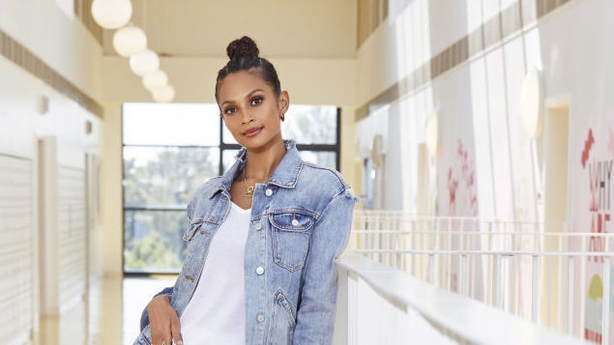Period poverty is a huge problem that’s just not being spoken about – and singer Alesha Dixon wants to change that. "Hearing the statistics is quite shocking," she says.
"Thinking about young girls and their wellbeing at school struck a chord with me."
Alesha is keen to talk about the issue and how it can affect the lives of young women.
The taboo around periods
There is such a stigma around periods and people tend to shy away from talking about it.
"As girls, we don’t particularly like to talk about periods, it’s not the most glamorous subject," Dixon says thoughtfully. "But there’s something quite cool about normalising it and speaking about it in a light-hearted manner – it doesn’t always have to be so serious."

Attitudes definitely are changing, and Dixon says: "My nan’s generation was brought up in a time when children were expected to keep quiet and not discuss personal things like periods.
"We now live in a time where sharing is normal – in fact, we probably overshare – and that can be a really positive thing if it’s used in the right way."
Period poverty has been around for as long as we’ve had pads and tampons, and yet it’s only really been talked about in the last few years – largely because people like Dixon are breaking the taboo and talking openly about menstruation.
A lot of unexpected coverage of me talking about my period - which is great, but also highlights the need to talk about periods more openly.
— Danielle Rowley MP (@DaniRowley) 29 June 2018
A woman mentioning her period shouldn't be such huge news - let's use this opportunity and work together to get to a place where it's not!
Periods and shame
Despite being a totally normal biological process, periods have historically been linked with shame.
"I’ve been speaking to a lot of girls at schools who say they’re embarrassed and don’t want the boys to mock them.
"Some don’t even like carrying sanitary products in their rucksacks because the boys laugh when they see them," says Dixon.
"It’s very juvenile, but it’s just a fact."
Other than an immature response to something most women go through every month, it’s clear many boys are woefully uneducated about periods, and Dixon wants something to be done about this too.
"It’s about bringing the boys into the conversation because they need to be more sensitive and empathetic towards girls. This will help normalise it for them too."
The long-term impacts
Period poverty can have far wider reaching effects than embarrassing teenage girls.
"We’re seeing a ripple effect," explains Dixon. "It can lead to depression and confidence issues, which then has an effect on career choices and what you do with the rest of your life."
"A lot of girls are very insecure and self-conscious, and that’s even before they’ve come across period poverty," continues Dixon.
"You can only imagine what it’s like for a girl who has to skip school – they become vulnerable and maybe end up being bullied.
"This can snowball into a lack of interest in their education, the after-effects of which are quite devastating.
"Some girls end up being homeless, and to even further extremes, some end up taking their own life. It’s a hard-hitting subject, but it’s really good to be talking about it."
THE BLOODY TRUTH. 1 in 7 struggle to afford period products, so some of our bloody babes have set up a petition asking Brighton & Hove Council to provide them for free to schools. Will you sign please? https://t.co/PoZR9Uwsc4 Fab artwork by Natalie Byrne #bloodygoodcreatives pic.twitter.com/99SbfZL55h
— Bloody Good Period. (@bloodygood__) 2 July 2018
What can be done
"A lot of people are embarrassed, so are suffering alone and in silence," says Dixon. "If people are encouraged to ask for help and speak out, then that would be brilliant."
She also thinks the education system should change. "When you’re at school, all the focus is on your grades," she says.
"But if we want young girls to leave school well-rounded human beings, we have to pay attention to their mental state as well as the academic side of things.
"This issue affects people who are struggling. In the same respect you can get free school meals if you’re from a low-income family, why can’t we put something in place for period poverty? I can’t believe that isn’t the norm."
For girls affected, Dixon says: "Hold your head up high, and if a boy sees a sanitary product in your bag you should just tell him: ‘If it wasn’t for a period you wouldn’t be here, so get over it and grow up,’
"There’s a way young girls can take control of it in a more ballsy, confident way, rather than being vulnerable, shy and embarrassed."
Alesha Dixon partnered with Always and the brand’s #EndPeriodPoverty campaign.
That’s why she’s partnered with Always and the brand’s #EndPeriodPoverty campaign.
Alesha Dixon partnered with Always and the brand's #EndPeriodPoverty campaign which has already donated 5 million pads, and hope to donate a further 5 million more to schools.

